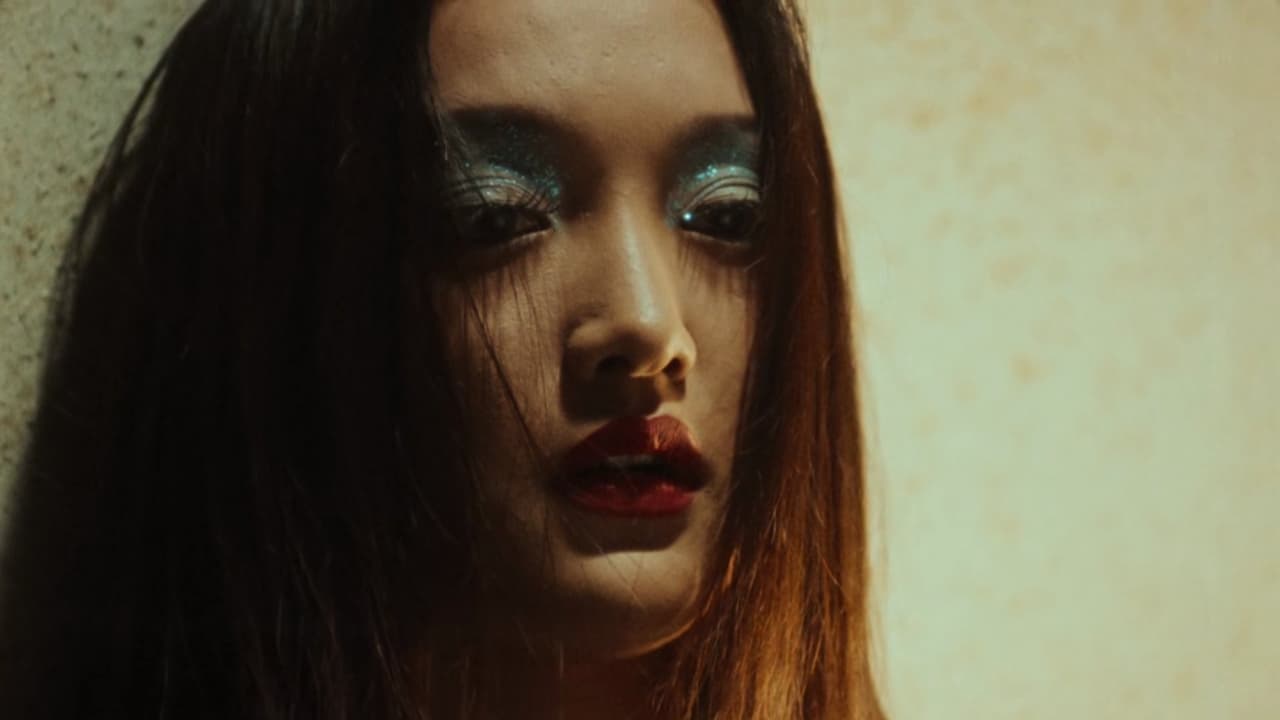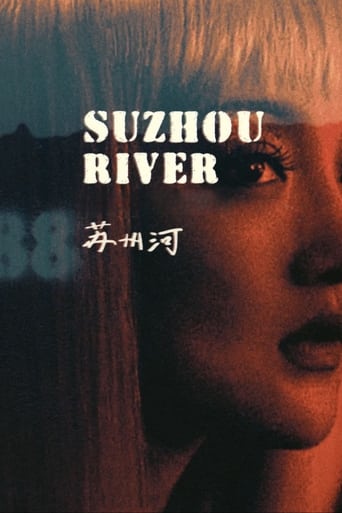

The film starts with a black screen with voice over of two lovers talking to each other which, to some extent, reminded me of the opening scene of Hiroshima Mon Amour (1959). The black screen gradually turns into dirty water of Suzhou River, a tracking shot from a boat shows us the old industrial buildings around the river, people, ships and the filthy river (as the narrator calls it) itself. Cold colors like blue and green are most obvious ones in this sequence but grey is dominating the whole scene, perhaps emphasizing on filthiness of the river. The scene is shot with a hand-held camera but we are not seeing through the narrator's eyes, we are seeing through his own camera, and it's differentiated from his own POV shots (that we will see a lot later in the film) through the use of zoom and jerky turns and sudden cuts in this scene. This is not a movie with linear storyline and this is a different time line from the prologue conversation, it's the latest and the current time line of the film, and all others are prior to it. We even hear the ending of the movie in the beginning from the narrator: "I saw bodies of two lovers being dragged near the river by the police." After the movie title comes up the narrator starts introducing himself to us through his own voice and eyes, now we have POV shots from the narrator himself. He uses past tense verbs so it's clear that we are again in a different time line from the previous scene. Also in the bar, we don't see everything the boss tells the narrator because of multiple jump cuts and finally he tells us himself that the guy wanted him to shoot his mermaid show. And this is the standard of the movie in early scenes; we don't usually hear characters talking, instead the narrator tells us what they said. The narrator goes on in the same time line to meet Meimei, the "mermaid". Here there are information that will make us confused later on about Meimei's real identity like that the narrator didn't know anything about her past, that she suddenly disappeared for days and that she was a "mermaid". As the narrator is telling us about Mardar and looking out of his apartment's window, we see a girl with ponytails and a guy on a motorcycle among the crowd and then there is a cut to medium shot of the guy on the bike, who is Mardar and that was the transition between two different time lines. The camera isn't the narrator's POV shot anymore and we begin to hear him less and less in the following parts. There is a shot in Mardar's back story where we slowly zoom in to a light bulb in his room and then cut to a sunny exterior shot which resembles of the iconic match to sun cut in Lawrence of Arabia (1962). As Moudan enters the story, there are some changes in cinematography; the camera gradually comes off-hand and goes on tripod, we start to see shots where camera is placed behind Mardar's shoulder whenever he is following Moudan (or in a later scene Meimei). When Moudan and Mardar are riding on the bike, we see them from the front; they can't see each other but we see both their face Moudan is happy and cheerful and we get a close-up to emphasize that in her face but Mardar seems emotionless! This kind of staging and camera position happens again with Moudan and Mardar at his apartment and also with Mardar and the criminal woman. We are used to seeing Mardar and Moudan close together when they are in a shot; either riding on his bike or cuddling at his apartment so it stands out when they are each on one end of the frame in a long shot where Mardar is taking her as a hostage to get money from her father. Their emotional distance is conveyed through their physical distance in this scene. Later parts of the film the camera goes hand-held again and we have the narrator's POV shots again, the narrator who is supposedly the only one left from the film. Interior shots are usually full of yellow, either yellowish props or a yellow beam of light. Also the night scene with Mardar Meimei and Mardar is unusually blue but still has yellowish interiors. Exteriors (which are almost all around the river) have pale, grayish colors with low contrast and foggy weather (that causes a strong aerial perspective) probably caused by fumes of the industrial buildings surrounding the river. This overall setting gives the exterior shots a sick and somber feeling that reminds of that of the opening shots of Red Desert (1964). Also Mardar's obsession with Moudan and similarities of Moudan and Meimei reminded me of Vertigo (1958).
... View Morei really really like this film, its so surreal yet it is set in the realistic city of shanghai..... i fell in love of it the first time i saw it. the story is so romantic yet so bleak about the idealisms of love...... i seriously couldn't go to sleep after watching that film...it makes me want to find a guy like Ma Da to fall in love with yet i dont want my love story to end up like theirs. so yeh if i was the camera dude, i would close my eyes and wait for the next when love arrives.the girl who plays peony is great, because she can differentiate her characters so well.
... View MoreThis is a wonderful movie. I am most taken with Zhou Xun (Meimei/Moudan). She played both roles impressively by giving each of them a character that is totally different from the other. Never once allowing the audience to believe that other than the looks (and the mermaid), nothing else about them is the same.Other then that... everything else about 'Vertigo' and stuff were mentioned by the others, so i shall not go into that.Great movie. One of my faves of all time.
... View MoreMost of this film is shot directly from the point of view of the narrator, an unseen videographer who travels the titular river recording the myriad stories played out on its banks and vessels. Even the scenes in which he is not involved could well be his thoughts of events as he recounts what he has been told by others and it is this that is initially the most striking element of Suzhou River. It makes the viewer feel much more involved in the unfolding tale, although at times the rapid cuts and shaky camera are unnecessarily disorientating.The narrator begins to tell us about his life - his job, his girlfriend Meimei who he obsessively videos and his fascination with the people of Suzhou River. But then this takes a back seat to his recounting of one of the many tales infamous within the community, of Mardar the motorcycle courier who is relentlessly searching the city for his lost love, Mudan. Her body was never found after she threw herself into the river from a bridge when Mardar was forced into kidnapping her by his gangland boss. But then this tragic story collides with our own narrator's as Mardar is convinced that he has finally found his long lost love and that she is Meimei. Obvious comparisons have been drawn to Vertigo's plot of a man undone by his lover's suicide and determined that he has found her again.This debut feature from Chinese director Lou Ye benefits greatly from his unconventional style which seems to make the events more tangible. He portrays the river itself as a metaphor for life, its swirling eddies and undercurrents the many stories it keeps within its deep mysterious heart, with no effect on the mass flow of life, but turning the individual lives of those involved upside down. The parts of the film dealing with the burgeoning affections of Mardar and Mudan are excellent (particularly for Zhou Xin, who plays both of the two vastly different lead female roles equally well) , however I felt the events gathered pace a little too quickly towards the end, rushing the story of the narrator and Meimei in comparison to that of Mardar and Mudan. The result of this was an ending which seemed a tad abrupt and so the empathy for the narrator was not as heightened as it might have been, even with the great device of us seeing everything through his eyes. Despite this Suzhou River is a stylishly original tale who's depth and undercurrents make it stand out from the majority of the flotsam and jetsam our video stores carry.
... View More